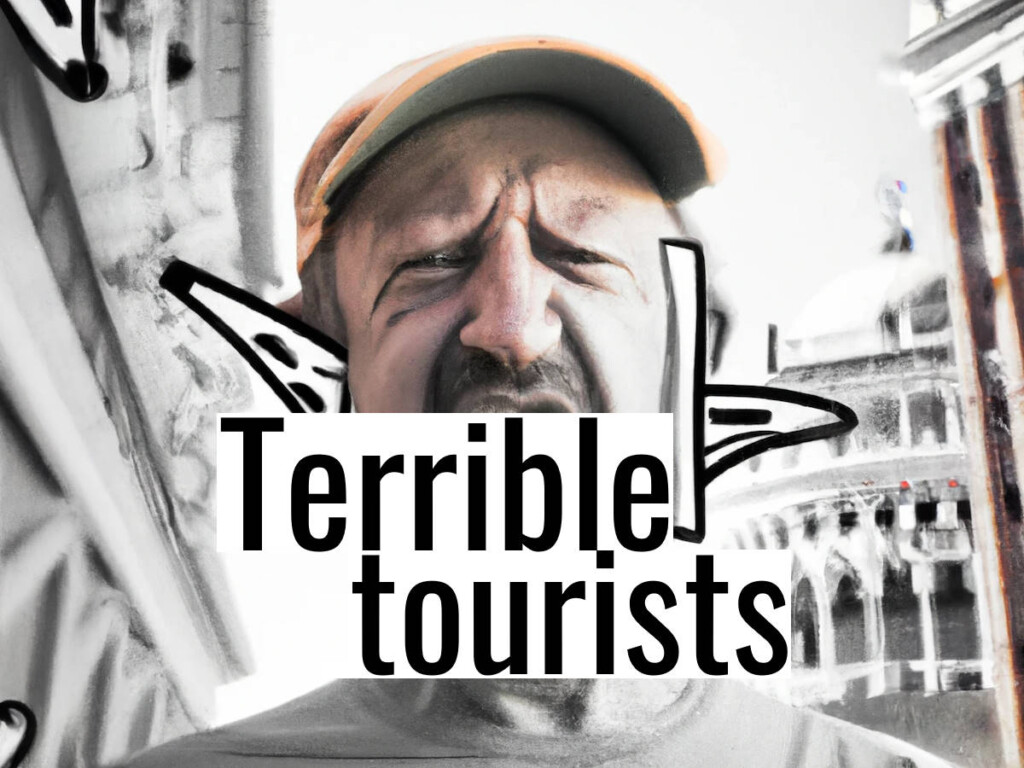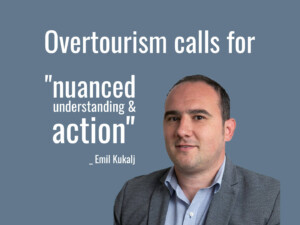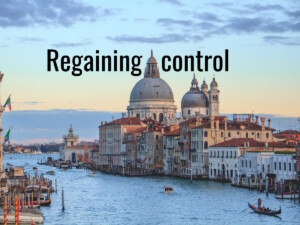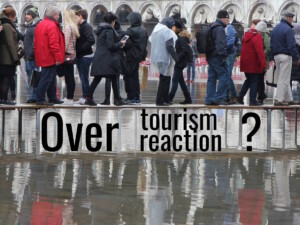Was this the European summer of terrible tourists? Give us a break, media!

“Hordes” and “swarms” of tourists “forced through a well-oiled funnel” to “crawl” through our cherished spaces, relegating them to “backdrops” for selfies.
Perhaps we should tell them to “go home” and “stay away” from our “perfect places”.
Is this the scapegoating propaganda of a paranoid authoritarian state? No, it’s just media portrayals of terrible tourists.
It’s a “Good Tourism” Insight by Jim Butcher.
[You too can write a “GT” Insight.]
COVID-19 decimated travel. Lockdowns divided families and loved ones, curtailed fun, stymied experiences, and devastated businesses.
Many fortunate enough to afford it looked forward to enjoying sunny climes, adventure, and cultural treasures. There was an element of pent-up demand; an urgency to make up for lost time.
But media commentaries on the first full post-pandemic year makes for pretty grim reading. Rather than celebrate a return to freedom and pleasure, many have portrayed tourism, and tourists, as a threat to local communities and the planet itself.
Tourists behaving badly
The bad behaviour of tourists has been a prominent theme.
An article in The Conversation opens with: “Travel is back in full swing this summer …” Good, you might assume. But “… and so is bad behaviour by tourists.”
Before summer had even started The Guardian declared: “The world’s most perfect places are being turned into backdrops for our tourist selfies.”
We are told that Italy (yes, the whole country) “despairs at the hordes” of tourists; that “if the tourism boom is often bad for locals, it’s equally depressing for visitors”.
The article repeats the anti-tourism trope that destinations have not learned sufficiently from lockdown and that less tourism is really a good thing. This is an inversion of reality, and contrary to what most people actually think.
The Guardian continues:
“Travel used to be about adventure and hardship, sometimes solitude, but invariably surprise and spontaneity. Now the road is so well-trodden and designated that you feel forced through a well-oiled funnel as someone picks your pockets.”
It’s a jaded view of both the tourist and the industry serving them.
While the world is far from perfect, there is great scope for enlightening encounters, discovery, adventure, and fun. And many more people get to do it. That’s progress.
The Financial Times led with: ‘Tourists are back. Is it time to tell them to stay away?’. Here’s the grim opening gambit:
“Tourists grin for selfies in front of the gates of Auschwitz. They dive into the Trevi fountain in Rome. One man carved his name and his girlfriend’s — ‘Ivan + Hayley 23’ — into the Roman Colosseum’s 2,000-year-old brick wall. A Russian influencer was deported from Bali with her husband after posting a nude picture of herself in front of a sacred 700-year-old banyan tree. In Amsterdam, stag parties wearing penis suits lie vomiting in gutters.”
Now I am not disputing that these things may have happened. But amongst millions of international tourists, they are surely the exception, not the rule.
And that’s not all they are doing wrong. The aforementioned, “all of them” — including the Russian in Indonesia, presumably — are “contributing to the current heatwave now afflicting much of southern Europe”.
Even the BBC (British Broadcasting Corporation), for whom balance is a legal requirement in UK law, entertains the anti-tourism line, asking the question ‘Is this the summer of bad tourists?’.
Larry Bleiberg, past president of the Society of American Travel Writers, writes: “This summer, every day seems to bring another headline of tourists around the world behaving badly.”
He’s not wrong. If you are looking for examples of bad behaviour, you’ll find them. But you might also miss the many benefits of cultural contact and conviviality. These, in my experience, leave bad behaviour standing.
Don’t miss other “GT” content by Dr Jim Butcher
Leaving your cares behind
It’s often suggested that being carefree can mean a lack of care for others.
Bleiberg, in his BBC piece, cites podcaster Gail Saltz who argues that, following years of lockdowns, people feel free to do what they couldn’t and “do them in spades” and think foreign countries are “a great big party and I get to do what I want”.
I’ve read, too, of a ‘low harm hedonism’ campaign amongst colleagues in the universities, echoing the impulse towards ‘nudging’ people in the direction of behaviour change.
No doubt there are badly behaved tourists. There always have been. The Grand Tourists of the 18th century were no angels, and the 19th century working class enjoyed a knees-up that sometimes got out of hand. Drunken antics, usually regretted the next day, are a constant in history.
The vast majority of people are respectful and kind on their travels, just as they are at home. You’ll miss a lot of humanity if you accept the caricatures of tourists often featured in the media (and, it should be said, too often in the universities and business schools training the new generation of tourism professionals).
Are cities learning from lockdown?
According to the Financial Times, “everyone complains about tourists”. That’s an urban myth if ever there was one.
“But now, possibly for the first time ever, a few European cities — with Amsterdam leading the pack — have begun doing something about them. The brief experience of tourist-free tranquillity in these places during lockdown is helping inspire change.”
This is a partial and pejorative take on mass tourism. What may have been tranquil for some was poverty for many others, and a denial of conviviality for most.
Some places have acted to limit tourism numbers, but the idea that this is motivated by a “brief experience of tourist-free tranquillity” is as likely as a skiing holiday in Holland.
Limiting numbers is most often simply about managing for positive impacts, mitigating overcrowding, and maximising revenue from higher spending tourists.
Barcelona!
Venice is, as ever, the over-touristy destination against which others are compared.
Barcelona risks “becoming a Venice”, we are told by FT.
Tourism has created major issues for Barcelona, undoubtedly. Yet its rapid development over the last 30 years since the Barcelona Olympics was, until recently, regarded as a positive model of regeneration.
Dissatisfaction with overtourism was grossly exaggerated back in 2017 (the year ‘overtourism’ became a term of reference). Tiny anarchist demonstrations were presented as the authentic voice of the people in much of the UK press; a classic case of an important issue deserving of sober consideration portrayed as a moral panic.
Don’t miss other “Good Tourism” content tagged “Carrying capacity, mass tourism, & overtourism”
Venice, vidi, vici?
But what of Venice?
The Telegraph says that the city has fallen “out of love with its tourists”. While Venice has its issues, even here some balance is needed.
Venice’s population, which we are frequently told is declining due to tourism, was declining regardless. Between 1951 and 1961, long before the boom in mass tourism, Venice’s population shrank from 174,000 to 137,000. In the same period, the population of suburban Mestre increased from 96,000 to 161,000.
This reflects trends that you’ll see in every city in Italy, and many beyond: The shift from city to suburb — economic activity moving from city centres to industrial zones — along with declining birth rates (striking in Italy over the period concerned), and an under-supply of housing pushing up prices in sought-after areas.
In Venice’s case, its suburbs are quite separate to the historic centre. They are in Mestre and other boroughs on the mainland, as well as on other islands. The historic city centre’s uniqueness makes it difficult to adapt and expand.
Tourism is creating problems in Venice but, in context, it also brings economic activity that sustains the people who remain in the old city, and pays for its maintenance. And Venice’s openness offers so many a chance to glimpse its sublime beauty.
In Venice, as in other popular destinations, solutions to tourism-related problems that are premised on an ‘anti-tourism’ narrative are likely to cause more harm than good.
The view of Europe from across the pond
Over in the United States, The Washington Post cuts to the chase with ‘Vandalism, tantrums and narcissism: Entitled tourists are out of control’. Apparently, “[w]hat is clear, according to academics, psychologists and travel industry professionals, is that tourists are frequently going rogue”.
Based on a few anecdotes, The Post reports on a global rise in “entitlement”. The trope of the entitled, selfish tourist is common, and usually repeated by people who feel they are above all of that. It’s the old ‘traveller versus tourist’ moral divide that flatters the former and caricatures the latter.
Criticisms of tourists’ misdemeanours sometimes even allude to social justice themes such as concern for local communities and age-old cultures. But the pejorative assumptions made in relation to today’s mass tourists are not so different from those of 19th century aristocrats who were disdainful of the working classes on their holidays.
Don’t miss other “Good Tourism” content about destinations & places in Europe
A Forbes headline reads ‘Tourists Go Home! Fed Up With Over-tourism, European Hotspots Impose Bans, Fines, Taxes’. The article asserts: “Literally overrun by tourists, a number of the most iconic destinations have become unlivable for local residents and overcrowded, unsafe and uncomfortable for visitors.”
“Overrun” (“literally”) and “unlivable”? Hyperbole about ‘overtourism’ is common.
Forbes echoes the pejorative characterisation of tourists as ‘hordes’. Apply the same vocabulary to migrants and it would, rightly, be seen as reflecting base prejudices.
Summer would not be summer without critics of “the British Tourist Invasion”. The New York Times — where crass caricatures of the UK are not unknown — displays its own prejudices by describing a Spanish resort that “crawls” with a “swarm” of young Brits.
Nevertheless the article acknowledges that these tourists are necessary. One business owner points out that they are the lifeblood of the economy; that the only bad tourists are the ones who don’t come.
Tourism’s portrayal as a necessary evil requires a pessimistic view of leisure travel.
Happy holidays!
There are commentators of a sunnier disposition, although, like an unoccupied sunbed by a Majorcan hotel pool, they are rare.
Ros Douthat in the New York Times provides a counterpoint to the naysayers and prophets of doom in his opinion piece ‘The case for tourism’.
And Rick Steves, whose life seems like one big holiday — that’s no criticism; I’m jealous! — is unlikely to follow the fashion for slating holidays. Quoted in the Washington Post article, Steves says:
“You need to have smart safeguards, but we need to have public access to the cultural wonders of this world. And that comes with a small and steady risk that bad people will do bad things. It’s a price worth paying.”
He’s right, of course.
So here’s to happy holidays! Cheers!
Agree? Disagree? What do you think about portrayals of tourism and tourists in the media? Share a short anecdote or comment below. Or write a “GT” Insight of your own. The “Good Tourism” Blog welcomes diversity of opinion about travel & tourism because travel & tourism is everyone’s business.
Featured image (top of post): Was this the European summer of terrible tourists? Give us a break! Surrealist representation of a terrible tourist by DALL‑E 2.
About the author

Jim Butcher is a lecturer and writer who has written a number of books on the sociology and politics of tourism. Dr Butcher blogs at Politics of Tourism, tweets at @jimbutcher2, and initiated Tourism’s Horizon: Travel for the Millions (a “GT” Partner) on Substack.





